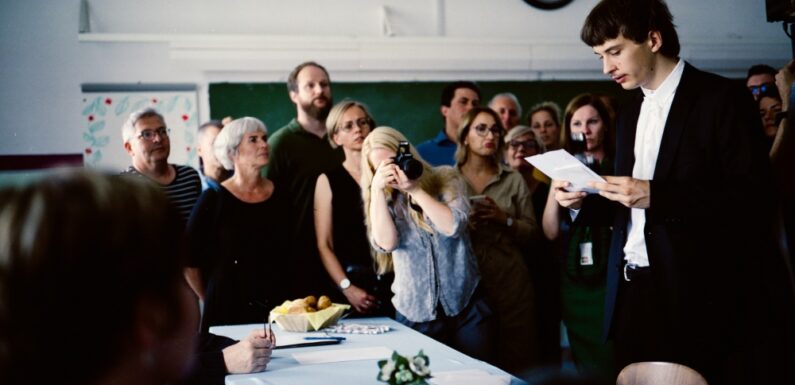
If we’ve learned anything from the last few years of polarized political discourse surrounding everything from gun control to gender identity, it’s that when somebody pulls out the “won’t somebody please think of the children” card, the children are rarely the first thing on their mind. Even as it plays out on a specifically Hungarian social landscape, the satire of Gábor Reisz’s astute, drily funny third feature “Explanation for Everything” — in which an underachieving high-schooler becomes a right-wing cause célèbre on the strength of some dicey tabloid reporting — resonates more widely. Escalatingly absurd but underpinned by a mordant plausibility throughout, this confidently imposing work is among the high points of this year’s Orizzonti sidebar at Venice.
Reisz scored a domestic hit, and made a strong impression on the international festival circuit, with his 2014 debut, the endearingly scruffy quarter-life crisis comedy “For Some Inexplicable Reason.” His 2018 follow-up “Bad Poems” maintained that off-kilter charm, but “Explanation for Everything” is a more polished, ambitious step up from its predecessors — even if, at over 150 minutes, it feels a little baggy. That’s not to overlook the artful staggering and overlapping perspectives of its construction, essential to the he-said/he-said tension that drives its story, but a little tightening could help the international distribution prospects of a film with much to say across borders.
To look at 18-year-old Abel Trems (Gáspár Adonyi-Walsh), you wouldn’t expect him to inspire any kind of movement or protest, but that’s just it: He’s the kind of blank slate onto which just about any cause can be projected. Diffident and unformed, neither especially bright nor notably dim, he’s struggling to study for his finals — distracted by, among other things, unrequited longing for his star-student best friend Janka (Lilla Kizlinger). History, taught by handsome, liberal-minded Jakab (András Rusznák), is giving Abel particular trouble, aggravated by his dislike for the teacher himself. Jakab and Abel’s conservative nationalist father György (István Znamenák) have previously clashed over political matters, but the boy’s issue with the former is simpler: Janka has the hots for him, and can’t see past her crush to anyone else.
Married with children, and burdened with an assortment of personal and professional strains, Jakab handles Janka’s declaration of love with sensitivity and tact, but a very different classroom quagmire awaits when Abel shows up for his oral history exam, and freezes on the spot. In an effort to get the kid to say anything at all, Jakab notices the nationality pin — traditionally worn by all on the anniversary of the 1848 War of Independence, but increasingly loaded as a nationalist party symbol — on Abel’s lapel and asks him about it. Forfeiting the exam and receiving a rare failing grade, a panicked Abel later diverts his parents’ ire by claiming he was penalized for wearing the pin.
The lie works rather too well. In addition to setting the short-fused György on Jakab’s case, it eventually — via a dizzy chain of reactionary community gossip, deftly shuffled by Reisz and co-editor Vanda Gorácz — reaches Erika (Rebeka Hatházi), an eager junior reporter for a right-wing tabloid, who senses in Abel’s tale potential for a divisive national scandal. Her instincts are as accurate as they are ethically dubious, and from here “Explanation for Everything” spirals into a perceptive, subtly chilling examination of our susceptibility to bad-faith journalism and trivialized politics, packaged into neat human-interest stories that prompt people across the left-right spectrum to fly off the handle.
Reisz himself maintains a warm human lens on a story that could veer into ghoulish allegory or hectoring rhetoric, pivoting principally between Abel’s and Jakab’s fractious households with a mutually sympathetic eye for everyday domestic comedy, aided by Kristóf Becsey’s fleet-footed, hand-held lensing — suffused with beckoning summer light that practically begs for this whole fiasco to be over. This pinballing structure also permits room for sidelong angles on the incident from various secondary parties, including Janka, outraged on her teacher’s behalf, and the school’s despairing principal, wondering why Erika couldn’t have covered their brand-new gym instead.
Reisz and Éva Schulze’s limber, lightly cynical script doesn’t overly both-sides the situation, though it doesn’t demonize anyone in the wrong: Erika is merely working a broken media system to her advantage, while György, a pitbullish building contractor who keeps losing young talent to the pull of western Europe, clearly harbors frustration at his country that he disguises as defensive pride. At the center of it all, Adonyi-Walsh sensitively plays Abel not as a cypher but as a specifically unremarkable boy, at once overwhelmed and enthralled by the storm building around him, all too aware that he may never again wield such power.
Read More About:
Source: Read Full Article